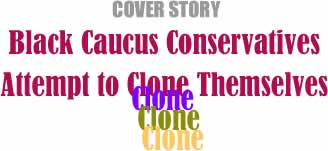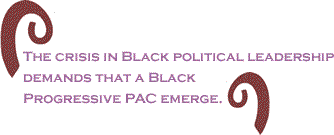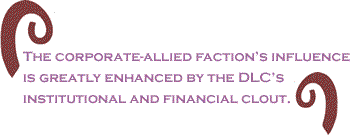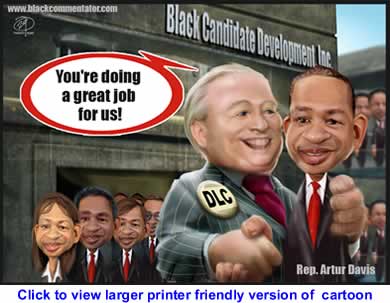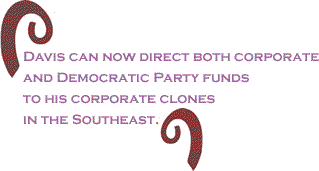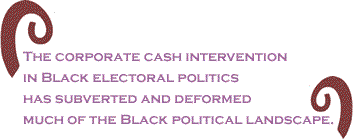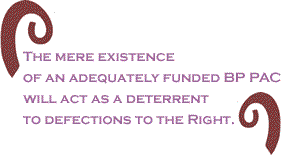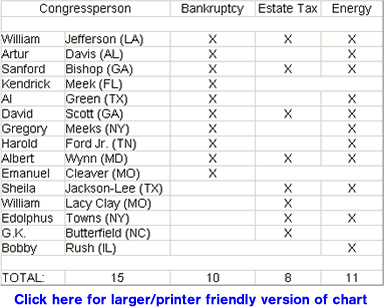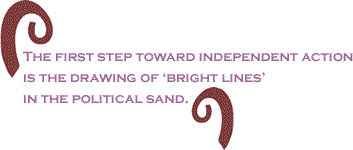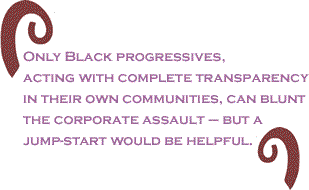
|
|||||||||||||||||||||
|
Corporate funding and influence have succeeded in placing the most rightwing members of the Congressional Black Caucus (CBC) in key positions that empower them to recruit and fund other business- and Republican-friendly Black candidates. Unless independent mechanisms are created to finance progressive CBC incumbents – and nurture challengers to the corporate contributions-rich members – the rightwing faction will replicate itself, and the Caucus will lose all but ceremonial value to Black America. Corporate-led members already exercise an effective veto power in the CBC, preventing the Caucus from taking positions on “bright line” issues vital to African Americans, but deemed inimical to wealthy interests. History will record that the CBC definitively lost its ability to act as a body on behalf of its national Black constituency last month, when 15 members voted with the Republicans on at least one of three critical measures: bankruptcy, repeal of the estate tax, and energy. (See chart in BC, “How to Fix the Fractured Black Caucus,” April 28, 2005.) Six members make up the core of defectors from the historical Black Political Consensus – deviants from the CBC’s proud 36-year progressive tradition: Harold Ford, Jr. (TN), Artur Davis (AL), David Scott (GA), Sanford Bishop (GA), Albert Wynn (MD), and William Jefferson (LA). All but Jefferson are members of the Democratic Leadership Council (DLC) and/or the Blue Dog Coalition, vehicles for corporate funding and intrigue in the Democratic Party. Having reached critical mass with the election of Alabama’s Davis and Georgia’s Scott in 2002, the corporate-allied faction’s influence is greatly enhanced by the DLC’s institutional and financial clout. Rep. Albert Wynn chairs the Caucus’s Political Action Committee, through which he can direct funds to incumbents and candidates. The congressman from Washington, DC’s relatively prosperous Maryland suburbs is the DLC’s key operative in the Caucus – which is doubtless the reason he sits in the money-chair. Wynn scored a grand slam for the Republicans in April, siding with the GOP on all three “bright line” measures, as did Bishop, Scott, and Jefferson.
Send in the Clones... Artur Davis occupies a far more dangerous position. Early this year, the 38-year-old Harvard Law School graduate and former prosecutor became one of two lawmakers in charge of the Democratic Party’s congressional candidate recruitment and development efforts in the Southeast. Davis was tapped by fellow DLCer Rahm Emanuel (IL), head of the Democratic Congressional Campaign Committee (DCCC), commonly known as the D-Triple-C. Ironically, the white half of the party’s Southeast candidate search team, Florida Congresswoman Debbie Wasserman Schultz, is a relatively progressive Democrat. She voted against all three “bright line” Republican measures, last month. However, as the Black member, Davis can be expected to hold sway over African American candidate recruitment and funding. Progressive Black congressional aspirants don’t stand a chance under Davis, who will cultivate pro-corporate candidates, thus pushing the Congressional Black Caucus further to the right, and irrelevance. Davis will clone himself. Boardroom choice for Alabama Black Belt Davis’s ascent is a near-pure product of massive, unprecedented corporate intervention in Black electoral politics – the direct cause of the current crisis in Black leadership. A marginal political figure in 2000, Davis garnered only 30 percent of the Democratic primary vote in his first challenge to four-term Rep. Earl Hilliard, a member of both the CBC and the Congressional Progressive Caucus. Then, in 2002, corporate cash rained down on the Black Belt. As BC reported on July 25, 2002, Hilliard didn’t know what hit him.
Davis was a beneficiary of the mid-Nineties corporate decision to change the political complexion of Democratic Black America. The scheme became operational in 2002, unseating Hilliard and Georgia Rep. Cynthia McKinney, and installing David Scott in a new district just south of Atlanta. Although the American Israel Public Affairs Committee (AIPAC) was eager to take credit for Hilliard’s and McKinney’s defeats, the offensive was actually hatched in corporate think tanks and boardrooms, years before. AIPAC crowed loudly, for intimidation effect, but corporate operatives deployed the big bucks and media.
Davis won 56 percent to 44 percent in the 60 percent Black district, garnering a minority of the Black vote and nearly all the whites. (He did, however, do somewhat better among Blacks than Denise Majette, who beat McKinney in Georgia with only about 16 percent of the African American vote.) Most Congressional Black Caucus members backed Hilliard. However, the Democratic Congressional Campaign Committee (D-Triple-C) provided only tepid and belated support to incumbent Hilliard in 2002. David Scott also enjoyed overwhelming corporate backing to win his first campaign for a suburban Atlanta seat, outspending his opponent by more than 3 to 1 ($1,286,263 to $409,831). Corporations spent lots of money to create the “Worst Black Congressperson.” In 2004, another money monsoon was arranged for Artur Davis’s benefit to ensure that Alabama’s Black Belt seat remained safe for corporate America. It was overkill. Davis spent $1,061,356 – 75 percent of it from business interests. His Democratic primary opponent, Albert Turner Jr., a Perry County Commissioner and son of a noted civil rights leader, raised only $26,340 – a 40 to 1 disadvantage. Turner’s pitiful war chest was about equal to the yearly household income of one median family in the district, the poorest in the CBC. The corporate largess that allowed Davis to spend over a million dollars to crush an impoverished opponent – well over twice the average CBC member’s campaign contributions per election cycle – marked him as a go-to Black guy in the Democratic Leadership Council (DLC), which arranged for his key posting as African American candidate recruiter. Davis can now direct both corporate and Democratic Party funds to his corporate clones in the Southeast, home to the majority of the U.S. Black population. He is the perfectly positioned Trojan Horse in African American electoral politics. In tandem with the DLC’s Albert Wynn (MD), chairman of the Congressional Black Caucus PAC, Davis has the power to eventually render the CBC unrecognizable – and institutionally useless for anything other than legislation acceptable to corporate boardrooms. BP PAC Clearly, the task is the create a Black Progressive PAC. In every previous generation, African Americans have discussed – and some have made efforts to create – mechanisms to independently fund Black political movements and electoral candidacies. At the turn of the 20th Century, when Booker T. Washington’s corporate-funded “Tuskegee Machine” wielded vast influence over Black political affairs, more radical Black voices struggled to make themselves heard, with scant resources. Marcus Garvey organized an African American grassroots fund-raising operation that has not been equaled, since. However, Garvey eschewed electoral politics in favor of reclaiming Africa.
Since the liberating Sixties, the Black political fund-raising conversation has revolved around finding resources to put more Black faces in high places – what we at BC call “head count politics.” This lack of in-depth attention to Black candidates’ detailed political agendas usually worked out well enough, in general. Despite individual cases of corruption, it was exceedingly rare that an African American elected from a Black majority jurisdiction would openly defy the historical Black Political Consensus on issues of peace, social and racial equality, public power vs. corporate domination, elemental fairness in the marketplace and public sphere, and the responsibility of government to reverse historical wrongs and inequities. All that has changed, most dramatically since 2002. The corporate cash intervention in Black electoral politics, closely coordinated with corporate media attacks on “civil rights-type” politicians, has subverted and deformed much of the Black political landscape. Although there is no evidence that the masses of Blacks have been persuaded to turn against themselves, a significant portion of the Black political class has been purchased or cowed. The house needs cleaning, before we can re-focus on expansion of Black political representation. The urgently needed Black Progressive PAC (BP PAC) must 1) be supported mainly by small donations from a broad base of predominantly Black donors, 2) fund and endorse candidates and incumbents based on their adherence to progressive positions on “bright line” issues, and 3) conduct extensive voter education and candidate development work, in the knowledge that overwhelming majorities of Blacks support progressive stances on “bright line” issues and, if informed, will vote accordingly. (In the last instance, BP PAC will clash directly with Rep. Artur Davis – the Black corporate clone-candidate developer at the D-Triple-C – and with Rep. Albert Wynn, if he remains head of the Congressional Black Caucus PAC.) Scope of the mission
To put the political and financial task in perspective, the entire Congressional Black Caucus – excluding the non-voting delegates from Washington, DC and the U.S. Virgin Islands and Illinois Senator Barack Obama – campaigns on less than $20 million every two-year election cycle. (Forty-one members x an average $466,188 in campaign contributions = $19,113,708.) BP PAC will not be required to intervene in most current CBC districts. About two-thirds of Caucus members are consistently progressive and need not be challenged, and most progressive members occupy relatively safe seats (for the time being). The mere existence of an adequately funded BP PAC, capable of mounting a serious challenge to incumbents who step over “bright lines,” will act as a deterrent to defections to the Right. A number of the 15 Black congresspersons that crossed one or more “bright lines” last month (see the chart, below), would not have done so if BP PAC existed. BC is of the opinion that the BP PAC donor base need not be as huge as many people might think – but everyone is welcome to do the math. Dr. Marcellus Andrews, Senior Research Fellow at the New America Foundation and a BC contributing writer, in a letter last week calculated that one million Blacks contributing $5 per month to a PAC would raise $60 million per year:
Since congressional election cycles are every two years, that comes to $120 million per congressional campaign season.
BC envisions a much more modest and quickly achievable donor base of 50,000 persons contributing an average of $100 per year: $5 million annually, $10 million every two-year election cycle. Ten million dollars is half the total spent each cycle by the combined full-voting House members of the CBC – more than sufficient to expose and expel the hardcore deviants from the historical Black Political Consensus, and put some spine (or fear) in wavering members. BP PAC would not, of course, confine itself to congressional races. The same corporate disease that is neutering the CBC afflicts Black caucuses in state legislatures across the country. The North Carolina Black Caucus, for example, has been fractured for years, with no common agenda. Other statewide caucuses exist in name only, as opportunistic members freelance their votes without fear of exposure or challenge. Shameless corporate servants occupy city halls in a growing number of predominantly Black cities, such as Republican-loving Ray Nagin in New Orleans, and voucher poster boy Anthony Williams in Washington, DC. Cory Booker, a wholly-owned subsidiary of the rightwing Bradley Foundation and the Wal-Mart family, is poised for another multi-million-dollar run for mayor of Newark, New Jersey. And there are many more Trojan Horses waiting to present themselves to an uninformed Black public. Let’s get it started In his letter to BC, Dr. Marcellus Andrews points out that a well endowed Black Progressive PAC would function as much more than a cash dispenser. “Black America could run its own money primary – where candidates campaign for the support of black PACs, which would in turn have to pay close attention to the views of their small contributors lest they lose an important part of their funding base.”
BP PAC could be the beginning of a desperately needed transformation of Black politics in the U.S. – and make no mistake about it, there is a huge pent-up demand among a majority of African Americans for new mechanisms of independent political action. Studies show that most Blacks favor the general idea of an independent Black political party. However, it should be clear to any sober observer that a Black polity that does not yet have the tools to keep its current elected representatives in check, is woefully unprepared to build a full-fledged party at this time. The first step toward independent action is the drawing of “bright lines” in the political sand, and the creation of mechanisms that punish and reward politicians based on their “bright line” behavior. BP PAC should be that mechanism. BP PAC must be independent of wealthy, corporate Blacks, who have their own ways of influencing public policy – as do all rich people. Remember that BET founder Bob Johnson orchestrated a petition by fifty rich, high profile African Americans in service of George Bush’s campaign to repeal the estate tax, in 2002. Earlier this year, Johnson tried to organize a “retreat” of invited Black notables to discuss the future of Black politics. A Black political fundraising mechanism was high on the agenda. However, any fund influenced by Johnson and his friends would wind up backing clones of Representatives Artur Davis, Albert Wynn, Harold Ford, David Scott, Sanford Bishop, and William Jefferson; Mayors Ray Nagin, and Anthony Williams; and rightwing darling Cory Booker, who share Johnson’s corporate worldview.
It costs money to raise money – to gather and service a funding base. Two weeks ago BC suggested that the Black Progressive PAC might be jump-started with very modest transfers of funds from the white-led left-liberal PACs that raised tens of millions of dollars in the previous election cycle. Some readers were understandably skeptical, on both principled and practical grounds. Our position is that African Americans comprise half of the total voting population that can reasonably be described as “progressive,” without whom the left-liberals would have no mass, concentrated presence in the U.S. It is counterproductive that the tens millions of dollars raised to fight for a progressive agenda remain almost totally under the management of whites – one of countless manifestations of white societal privilege – when Blacks are the group most committed to progressive politics. If the corporate offensive in the Black Democratic arena is allowed to do further damage, progressive politics in America will disintegrate. Only Black progressives, acting with complete transparency in their own communities, can blunt the corporate assault – but a jump-start would be helpful. White progressives with access to money are obligated to assist in preventing a corporate takeover of Black electoral politics. It is in their own interests. Once the initial mechanisms are in place, BP PAC would be off and running on its own – independent, self-sustaining, and powerful. With or without white left-liberal help, the crisis in Black political leadership demands that BP PAC emerge. In the process of freeing Black politics from corporate strangulation, African Americans will also determine if the Democratic Party is a fit vessel for our presence. The first step is to identify, target and purge from office those corporate Black Democrats who are, as we speak, busily cloning themselves. BC Co-Publishers Glen Ford and Peter Gamble are working on a book to be titled, Barack Obama and the Crisis of Black Leadership. |
Your comments are always welcome. Visit the Contact Us page to send e-Mail or Feedback or Click here to send e-Mail to [email protected] e-Mail re-print notice
If you send us an e-Mail message we may publish all or part of it, unless you tell us it is not for publication. You may also request that we withhold your name. Thank you very much for your readership. |
| May 12 2005 Issue 138 |
|||||||||
|
|||||||||
|
|
|||||||||
| Printer Friendly Version | |||||||||
 |
|||||||||
 |
|||||||||
| |
|||||||||
| |
|||||||||





















